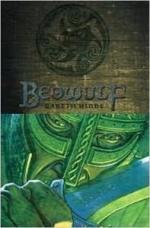That
he wildly wasted his war-gear undoubtedly
When
battle o’ertook him.[2] The troop-king no need
had
50 To glory
in comrades; yet God permitted him,
{He, however, got along without you}
Victory-Wielder,
with weapon unaided
Himself
to avenge, when vigor was needed.
I
life-protection but little was able
To
give him in battle, and I ’gan, notwithstanding,
{With some aid, I could have saved our liegelord}
55 Helping
my kinsman (my strength overtaxing):
He
waxed the weaker when with weapon I smote on
My
mortal opponent, the fire less strongly
Flamed
from his bosom. Too few of protectors
Came
round the king at the critical moment.
{Gift-giving is over with your people: the ring-lord is dead.}
60 Now must
ornament-taking and weapon-bestowing,
Home-joyance
all, cease for your kindred,
Food
for the people; each of your warriors
Must
needs be bereaved of rights that he holdeth
In
landed possessions, when faraway nobles
65 Shall
learn of your leaving your lord so basely,
{What is life without honor?}
The
dastardly deed. Death is more pleasant
To
every earlman than infamous life is!”
[1] For ‘daedum raedan’
(2859) B. suggests ‘deaeth araedan,’ and
renders:
The might (or judgment)
of God would determine death for every man,
as he still does.
[2] Some critics, H. himself in earlier editions, put the clause, ‘When ... him’ (A.-S. ‘þa ... beget’) with the following sentence; that is, they make it dependent upon ‘þorfte’ (2875) instead of upon ‘forwurpe’ (2873).
XL.
THE MESSENGER OF DEATH.
{Wiglaf sends the news of Beowulf’s death to liegemen near by.}
Then
he charged that the battle be announced at the hedge
Up
o’er the cliff-edge, where the earl-troopers
bided
The
whole of the morning, mood-wretched sat them,
Bearers
of battle-shields, both things expecting,
5
The end of his lifetime and the coming again of
The
liegelord beloved. Little reserved he
Of
news that was known, who the ness-cliff did travel,
But
he truly discoursed to all that could hear him:
[98]
{The messenger speaks.}
“Now
the free-giving friend-lord of the folk of the Weders,
10 The folk-prince
of Geatmen, is fast in his death-bed,
By
the deeds of the dragon in death-bed abideth;
Along
with him lieth his life-taking foeman
Slain
with knife-wounds: he was wholly unable
To
injure at all the ill-planning monster




